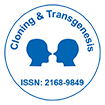
క్లోనింగ్ & ట్రాన్స్జెనిసిస్
అందరికి ప్రవేశం
ISSN: 2168-9849

ISSN: 2168-9849
Yue Zhang
Nutrigenomics may tell us how various nutrients interact with the genome and potentially cause alteration of gene expressions. One nutrient of particular interest is vitamin D, deficiency of which may lead to diseases in various human organ and muscle systems. Decoding the genetics of complex diseases such as autoimmune diseases and/ or cancers associated with the aging process is vital to understand the controversies the beneficial effects of vitamin D supplementation on these diseases. Based on comparative advantages of different model system and recent ChIPseq/ ChIP-chip studies, we previously proposed one novel insightful hypothesis: the genetic regulatory network of Vitamin D Receptor (VDR, homologue of DAF-12 in Caenorhabditis elegans) may act as a common basis in preventing some autoimmune diseases and associated cancers. Further, such diseases may burst up with polygenic genetic mutations and/or variations in that deficiency of vitamin D and lacking of UVB lead to the mal-functional DAF-12/ VDR and lose its buffering potential as a capacitor. The aberrance of environmental factor-induced DAF-12/VDR may counter-intuitively lead to in situ dys-regulation of the expression of an array of its target genes and locallyinduced autoimmunity because of the citrullination of in situ dys-regulated genes, which may be mediated by the VDR-orchestrated autophagy process. Being consistent with the “hygiene hypothesis” and the “danger signals” theory, some VDR/DAF-12 targets may be directly involved in these processes. Several testable predictions will be briefly discussed.